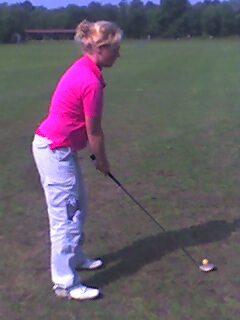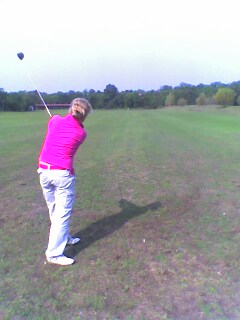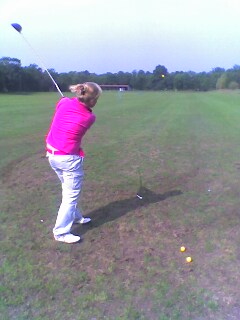PIN HIGH CLINICS IN ETIOLLES SEPTEMBER 12th to SEPTEMBER 16th
AIM OF THE CLINIC :
- Improving your technical acknowledges or learn what to do in the future.
The aim is not to change all you learnt before (advanced), but to show you the
way towards a better swing.
- Personal adaptation to these technical drills because the bodies are not the
same. In fact, what is important is to control the impact zone, not to move the
right way.
- Set up of a more confident swing, to show you that you're able (beginners) to
go on the course very quickly and avoid future physical
problems
Anyway, there won't be any difference between "beginners language" and "advanced language". We will not learn "WHAT TO DO" but "WHY TO DO IT". We will not change anything about what you learnt before. We will just help you to know what to do.
My aim is to make you understand and feel that you're able to play golf better if you have the right basics. First of all, you have to trust yourself by knowing more about the technic of golf.
That's the same introduction every week. But this week will be quiet different. You have the chance to be just two of you during this clinic, so it will be very easy to work as an individual way, correcting the mistakes of both of you
Advice : Beware what you look at. As you're (as everybody in the world) looking "at" the ball, you are so looking at the top of the ball. In the deep grass, this could be a way to top the ball, because you want the club to go back to where you look. You should so look at the grass behind (or before, if you prefer) the ball. This will help you to hit the grass, instead of topping the ball.
The order of the things is "fingers - arms - shoulders". So if you want the ball to roll, the backswing will be short and the follow through willbe helped by turning the shoulders during the impact. For the ball to fly, the backswing will be wider and the fingers and wrists ( instead of shoulders) will help to make the ball fly higher.
Position : Hitting line in the middle of the stance, weight on the left foot (burying the foot), ball a little left of the hitting line. Remember that the perpendicular to club face must be able to pass over the "wall". Otherwise, it will be impossible to throw the ball out. Beware to aim "far" from the ball, because as you are not allowed to touch the sand before hitting the ball, the mistake is to start over the sand, but over the ball too. So what we called the "lowest part of the circle" will be too much on the left and you will top the ball.
PRESENTATION OF THE METHOD :
To hit a golf ball properly, you need to respect a few fundamental rules :
- The hitting posture is
the same as the starting
posture
- The swing is as symetrical as possible (The
finishing posture is a consequence of the speed, not an obligation)
- The path of the club is the same during the backswing
and the downswing
What is going to be important is the fact that you have to find the points you
have to pass by, instead of the physical way you have to move . You have to
decide, too, what you really want to do. "Hitting the ball well" is
not the right answer, because to do so, you must respect too many rules at the
same time. We have to build the swing step by step, so that you just think about
one thing at the same time.
Finish : The fact to turn your shoulders towards the target finishing the swing is a consequence of the speed of the swing. You don't have to think about it. That's what we're going to work on during the week.
What is following is important for you to understand the reasons why the ball sometimes flies to the right or to the left. The first mistake, as I explained you, is "not to control" the hitting area. To control this area, you must be sure that the way the club swings is the right one.
THE SIX PARTS OF THE SWING :
Concerning the top of the backswing, I can give you a last advice.
The "important things" at that point of the swing are : right arm parrallel to the ground and the shaft making an angle of 90° with the right forearm.
THE WRISTS : The control of the wrists (in fact the fingers, as we explained it) helps to control the direction of the ball. Most of the time, you're not trying to send the ball straight. You're preventing the ball from flying to the right or to the left. That's why you can't correct the fact that the ball flies to the right if you can't make it fly to the left on purpose. You'll be able to feel the importance of the wrists (closing or opening the club face during the impact zone) only if you stay what we called "behind the ball". That means at the moment you hit the ball, your head shouldn't be over the ball or more on the left (for right-handed players). Your head was behind the ball while you were addressing the ball, it has to stay behind while you hit.
Working on half shots to feel the way to give speed to the club face :
DAY 2 : Tuesday September 13th
ON THE COURSE :
ON THE DRIVING RANGE :
WOOD ON A TEE :- The main difference is in the distance from the ball. As the swing will be wider and faster down, the strike will happen "higher" than usual, that means a few centimeters over the ground. If the club lies just behind the ball, you will hit the ball in the heel of the club. So you're going to miss the ball. You have to set up with the club "beside" the ball. Just lifting the hands up, you see that the club face is perfectly against the ball. So you can find it easier during the downswing.
- The posture is your own. It depends on the size, the elasticity of the body, the weight and many other things.
We saw that the weight transfer is necessary to give power to the strike. You have to feel that the weight tranfer begins just at the moment you begin to swing your hands down back to the ball. That is going to help your body to turn while hitting.
If you want to understand better, just remember what we said about the "9 trajectories". Right, left, straight and two spins per family. That means nine possible trajectories. The shaft gives the first direction and the way the club is opened or closed in the hitting zone gives the end of the flight.
ANIKA : Beware to control the height of your backswing. You saw that when the backswing is not too much wide, you control the swing better
MICHELLE : Pay attention to "Position N° 5". It is the way to control the direction of the ball.
|
|
We worked on the backswing. As you can see on the first picture, the problem is that the hands are too much "behind". On the second picture, the backswing is shorter but the hands are "deside" you, and so it will be easier to follow the right line towards the target. Anyway, as we said, there is a very small difference between the two pictures. |


 |
The solution is in the posture. On the second and third picture, your body is too much bent over the ball to allow you to swing widly, transferring your weight. That is why your feet keep stuck on the ground, preventing the club to go towards the target. Remember the first picture : your neck must be 90° with the shaft. |
DAY 3 : Wednesday September 14th
I don't think we can give Putting lessons. This part of the game is quiet personal. It is a question of feeling, more than technic. But We could study some basics and give some drills to improve in the future.
Remember the exercise with the two clubs aiming towards the hole. The putter must not touch the clubs shafts while you swing it. Think about the distance for long putts and about the direction for short putts.
AROUND THE GREEN :
Chipping with 9 iron or 7 iron on the sloppy green:
- The swing must look like a clock. We saw that you can imagine three widths for the swing :
DAY 4 : Thursday September 15th
WARM UP :
1 - Take two clubs at the same time in your hands and try to swing them the way you usualy do it with one club. After a few swing relaxing to make the exercise easier, drop one of the clubs and swing the other one. You should feel how light it is. It means that most of the time, you are to stiff and you hold the club too tight.
2 - Take one club in each hand and try to swing them so that they don't touch each other during the swing. This is to help you to feel the association between the right side and the left side.
TO WORK : Exercise of the wall . You swing "back against the wall", to check the plan of the swing. If you turn the shoulders to fast (before raising the hands), you're going to touch the wall. This exercise will give you the right feeling of the backswing.
|
|
You can see now that the backswing is perfect. The hands
are now upon your neck, instead of behind as we see on Day 2. The club
shows the target, that means it follows the line.
Much better ! |
|
|
Same improvement as Anika. Last day, the feet were
"stuck" on the ground. That's not the case now. That helps
you to work on "Position N°5", to control the direction of
the ball.
Perfect ! |
DAY 5 : Friday September 16th
Today is a relaxing day. We practiced a few of the shots we learnt this week, just to remember the last advices. We've been working a lot this week and I think that you all improved your acknowledges and your swing. Now you need to gain confidence in yourself by playing more and more. To perform our clinic, the best way was to have an individual report on what you're supposed to work in the future. So I hope the pictures we took will help you to do so.
I want to tell you that I enjoyed a lot to work with all of you (I repeat that every week, but I really mean it) and I hope to see you again in another PinHigh location
TOT ZIENST !